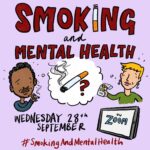A drug is a chemical substance that acts on the brain and nervous system, changing a person’s mood, emotion or state of consciousness. Drugs are often classified by the effect they have.
Stimulants, such as cocaine, make people feel full of energy. Depressants (or sedatives), such as heroin, make people feel relaxed. Hallucinogens, such as LSD, make people see, feel or hear things that are not real. Drug or substance misuse is when a person regularly takes one or more drugs to change their mood, emotion or state of consciousness.
Intimate partner violence among non-binary people who use drugs and alcohol: what do we know?

Vishal Bhavsar explores the largest ever study on experiences and perpetration of intimate partner violence and abuse in non-heterosexual relationships, with data from the Global Drug Survey, COVID Special Edition.
[read the full story...]









